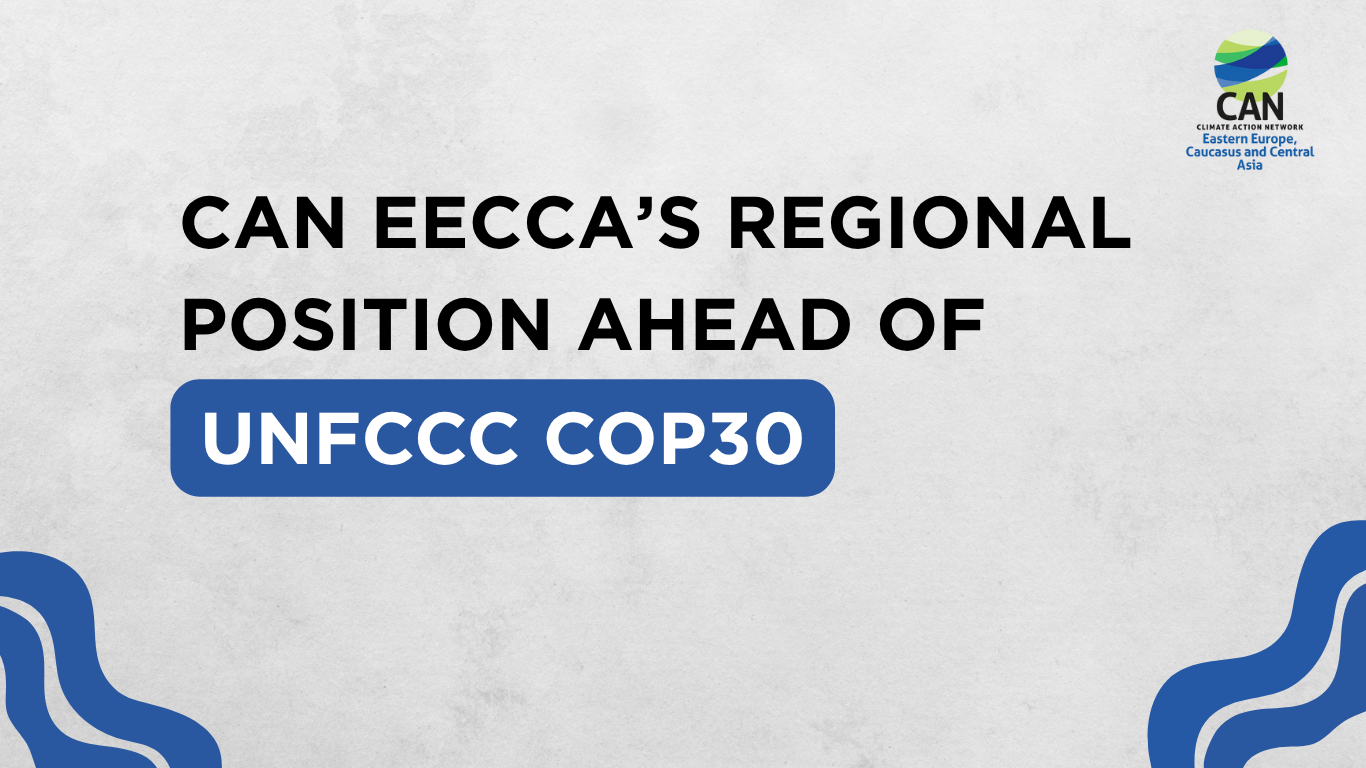
The Climate Action Network of Eastern Europe, the Caucasus, and Central Asia (CAN EECCA) presents a unified position calling for climate finance justice, ambitious NDCs, a legally established mechanism for a just transition, a fossil fuel phase-out, and the protection of human rights.
COP30 marks the first conference in the new ten-year cycle for implementing the global climate finance mechanism.
For the EECCA region — where war, authoritarianism, climate vulnerability, and fossil fuel dependence intersect — justice, transparency, and human rights are the only path to a sustainable future.
- Climate Finance and Justice
- There can be no climate finance without human rights, and no finance without transparency.
- North–South and South–South flows should complement each other: governments remain the main providers of funds, supported by private donors, foundations, and, in the future, innovative mechanisms rooted in financial justice.
- Although COP30 will not define exact numbers, it is essential to establish principles of fair distribution, with a priority on funding for the most vulnerable communities and sectors, including public healthcare systems and public participation.
- Funds must reach local communities, women, youth, and NGOs directly.
- Article 6.8 of the Paris Agreement — non-market international cooperation — should become an important complementary tool for pooling finance, innovation, and knowledge, particularly in our region.
- A significant portion of climate finance must be allocated to building climate-resilient health systems. This includes funding for early warning systems for heatwaves, infectious diseases and natural disasters, training medical personnel, and ensuring healthcare infrastructure can withstand climate impacts. Investing in health is investing in sustainable human development and a core element of climate justice.
Financial justice is impossible without democracy and care for people.
- Nationally Determined Contributions (NDCs)
Countries of the EECCA region must strengthen their climate commitments by enhancing the ambition, transparency and inclusiveness of their NDCs. To align with the Paris Agreement, the EECCA countries should:
- Increase emission reduction ambitions and include in their NDCs mechanisms for a just transition and fossil fuel phase-out, explicitly accounting for the significant public health co-benefits of these actions, such as the reduction of air pollution-related diseases. Utilize the new adaptation indicators developed under the UNFCCC, including those related to health (e.g., number of people protected from climate-sensitive health risks), to ensure the effectiveness and sustainability of results;
- Ensure public monitoring and equal access to data.
- Integrate a dedicated ‘Health’ component into NDCs. Countries should develop and fund national adaptation plans for the health sector, outlining concrete measures to monitor, prevent, and manage the health impacts of climate change, from heat stress to vector-borne diseases.
- Move beyond a purely sectoral and technocratic approach. Current NDCs in the EECCA region are predominantly limited to energy, industry, or agriculture targets, often neglecting the human dimensions of climate action. NDCs must reflect how climate policies will affect and protect people — their rights, livelihoods, labour conditions, and social security — ensuring that no one is left behind in the transition.
- Ensure meaningful participation of diverse stakeholders, including workers’ unions, local communities, women, youth, Indigenous Peoples, and civil society, in the design, implementation, monitoring and evaluation of NDCs. Inclusive governance is key to legitimacy and effectiveness of climate action.
- Anchor NDCs in a human rights-based approach, ensuring coherence with commitments under international human rights and labour standards. Recognizing the right to a healthy environment and safe working conditions should guide national climate goals and implementation plans.
Ambitious NDCs must become a genuine tool for sustainable development.
- Fossil Fuel Phase-Out and Just Transition
CAN EECCA calls for the urgent establishment of the Belem Action Mechanism (BAM) — a legally binding framework to ensure a just transition that prioritizes social protection, workers’ and human rights, public health and the creation of green, decent jobs.
To stay at the 1.5 C limit, countries must eliminate fossil fuel subsidies, which currently incentivize air pollution and its associated health burdens, develop roadmaps for phase-out, and redirect resources toward renewable energy and low-carbon innovation.
The phase-out of fossil fuels is, first and foremost, a critical public health intervention. It will lead to immediate improvements in air quality, reducing the incidence of asthma, cardiovascular and respiratory diseases, and premature deaths. The Belem Action Mechanism must recognize and leverage these health arguments to build broader public support for the transition.
- Civil Society and Human Rights
The shrinking space for NGOs and media in the EECCA region poses a serious threat to the implementation of the Paris Agreement and stands in direct contradiction to the principles of the UNFCCC. It also prevents the dissemination of vital information about climate-related health risks and undermines public health responses. Climate action cannot succeed in an environment where human rights are denied, voices are silenced, and civic participation is restricted. Civil society participation must be protected at all levels, and NGOs, activists, Indigenous/local communities should be recognized as equal stakeholders at all levels of governance — from local implementation to global negotiations.
- Without human rights, there will be no climate justice.
- Without transparency, there will be no trust.
- Without trust, there will be no future.
- Without access to information and public participation, there can be no effective protection of the basic human rights to a healthy environment and health in a changing climate.
Who We Are
The Climate Action Network of Eastern Europe, the Caucasus, and Central Asia (CAN EECCA) unites 59 organizations from 11 countries working to advance climate justice, democratic governance, and the transition to carbon neutrality. Almost all of our countries are part of the Global South, and our cooperation—within the region and beyond—is a vital contribution to the global climate movement.
10 November 2025
Дата публикации позиции: 11.11.2025
